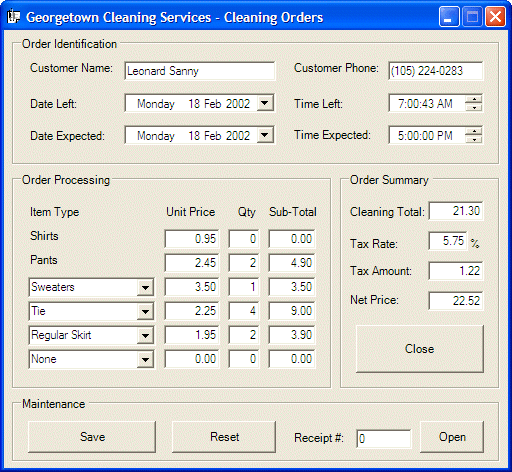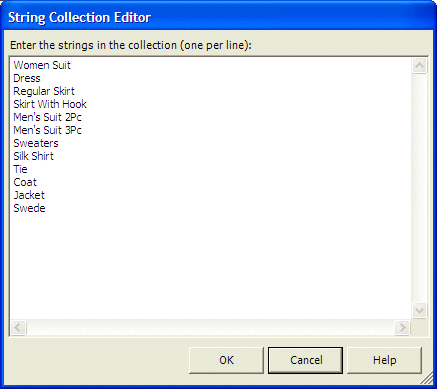
MS Visual Basic .NET Applications:
Georgetown Cleaning
Services
 |
MS Visual Basic .NET Applications: |
|
Introduction to Serialization |

|
|
|
This application follows the Georgetown Cleaning Services that primarily demonstrated the use of various Windows controls such as the date picker, the time picker, and bitmap buttons. One of the issues that was not dealt with was the ability to save the customers orders. In this application, after a customer's order has been processed, we will allow the user to save it. |
|
|
 |
||||||||||||||||||||||||||||||||||||||||||||||||||||||||||||||||||||||||||||||||||||||||||||||||||||||||||||||||||||||||||||||||||||||||||||||||||||||||||||||||||||||||||||||||||||||||||||||||||||||||||||||||||||||||||||||||||||||||||||||||||||||||||||||||||||||||||||||||||||||||||||||||||||||||||||
|
||||||||||||||||||||||||||||||||||||||||||||||||||||||||||||||||||||||||||||||||||||||||||||||||||||||||||||||||||||||||||||||||||||||||||||||||||||||||||||||||||||||||||||||||||||||||||||||||||||||||||||||||||||||||||||||||||||||||||||||||||||||||||||||||||||||||||||||||||||||||||||||||||||||||||||

Private Sub dtpTimeLeft_ValueChanged(ByVal sender As System.Object, ByVal e As System.EventArgs) _
Handles dtpTimeLeft.ValueChanged
Dim dateLeft As DateTime = Me.dtpDateLeft.Value
Dim timeLeft As DateTime = Me.dtpTimeLeft.Value
Dim time9AM As DateTime = New DateTime(timeLeft.Year, timeLeft.Month, timeLeft.Day, 9, 0, 0)
' if thenthe customer leaves clothes before 9AM...
If timeLeft <= time9AM Then
' ... then they should be ready the same day after 5PM
Me.dtpDateExpected.Value = dateLeft
Me.dtpTimeExpected.Value = New DateTime(dateLeft.Year, dateLeft.Month, dateLeft.Day, 17, 0, 0)
Else
' if thenthe clothese were left after 9AM, they will be availablethe following morning at 8AM
Me.dtpDateExpected.Value = New DateTime(dateLeft.Year, dateLeft.Month, dateLeft.Day + 1)
Me.dtpTimeExpected.Value = New DateTime(dateLeft.Year, dateLeft.Month, dateLeft.Day + 1, 8, 0, 0)
End If
End Sub
|
Private Sub CalculateTotal()
Dim unitPriceShirts As Double
Dim unitPricePants As Double
Dim unitPriceItem1 As Double
Dim unitPriceItem2 As Double
Dim unitPriceItem3 As Double
Dim unitPriceItem4 As Double
Dim subTotalShirts As Double
Dim subTotalPants As Double
Dim subTotalItem1 As Double
Dim subTotalItem2 As Double
Dim subTotalItem3 As Double
Dim subTotalItem4 As Double
Dim qtyShirts As Integer
Dim qtyPants As Integer
Dim qtyItem1 As Integer
Dim qtyItem2 As Integer
Dim qtyItem3 As Integer
Dim qtyItem4 As Integer
Dim cleaningTotal As Double
Dim taxRate As Double
Dim taxAmount As Double
Dim netPrice As Double
' Retrieve the unit price of this item
' Just in case the user types an invalid value, we are using a try...catch
Try
unitPriceShirts = CDbl(Me.txtShirtsUnitPrice.Text)
Catch exc As FormatException
MsgBox("The value you entered for the price of shirts is not valid" & _
vbCrLf & "Please try again")
End Try
' Retrieve the number of this item
' Just in case the user types an invalid value, we are using a try...catch
Try
qtyShirts = CInt(Me.txtShirtsQuantity.Text)
Catch exc As FormatException
MsgBox("The value you entered for the number of shirts is not valid" & _
vbCrLf & "Please try again")
End Try
Try
unitPricePants = CDbl(Me.txtPantsUnitPrice.Text)
Catch exc As FormatException
MsgBox("The value you entered for the price of pants is not valid" & _
vbCrLf & "Please try again")
End Try
Try
qtyPants = CInt(Me.txtPantsQuantity.Text)
Catch exc As FormatException
MsgBox("The value you entered for the number of pants is not valid" & _
vbCrLf & "Please try again")
End Try
Try
unitPriceItem1 = CDbl(Me.txtItem1UnitPrice.Text)
Catch exc As FormatException
MsgBox("The value you entered for the price is not valid" & _
vbCrLf & "Please try again")
End Try
Try
qtyItem1 = CInt(Me.txtItem1Quantity.Text)
Catch exc As FormatException
MsgBox("The value you entered is not valid" & _
vbCrLf & "Please try again")
End Try
Try
unitPriceItem2 = CDbl(Me.txtItem2UnitPrice.Text)
Catch exc As FormatException
MsgBox("The value you entered for the price is not valid" & _
vbCrLf & "Please try again")
End Try
Try
qtyItem2 = CInt(Me.txtItem2Quantity.Text)
Catch exc As FormatException
MsgBox("The value you entered is not valid" & _
vbCrLf & "Please try again")
End Try
Try
unitPriceItem3 = CDbl(Me.txtItem3UnitPrice.Text)
Catch exc As FormatException
MsgBox("The value you entered for the price is not valid" & _
vbCrLf & "Please try again")
End Try
Try
qtyItem3 = CInt(Me.txtItem3Quantity.Text)
Catch exc As FormatException
MsgBox("The value you entered is not valid" & _
vbCrLf & "Please try again")
End Try
Try
unitPriceItem4 = CDbl(Me.txtItem4UnitPrice.Text)
Catch exc As FormatException
MsgBox("The value you entered for the price is not valid" & _
vbCrLf & "Please try again")
End Try
Try
qtyItem4 = CInt(Me.txtItem4Quantity.Text)
Catch exc As FormatException
MsgBox("The value you entered is not valid" & _
vbCrLf & "Please try again")
End Try
' Calculate the sub-total for this item
subTotalShirts = qtyShirts * unitPriceShirts
subTotalPants = qtyPants * unitPricePants
subTotalItem1 = qtyItem1 * unitPriceItem1
subTotalItem2 = qtyItem2 * unitPriceItem2
subTotalItem3 = qtyItem3 * unitPriceItem3
subTotalItem4 = qtyItem4 * unitPriceItem4
' Calculate the total based on sub-totals
cleaningTotal = subTotalShirts + subTotalPants + subTotalItem1 + _
subTotalItem2 + subTotalItem3 + subTotalItem4
taxRate = CDbl(Me.txtTaxRate.Text)
' Calculate the amount owed for the taxes
taxAmount = cleaningTotal * taxRate / 100
' Add the tax amount to the total order
netPrice = cleaningTotal + taxAmount
' Display the sub-total in the corresponding text box
Me.txtShirtsSubTotal.Text = subTotalShirts.ToString("F")
Me.txtPantsSubTotal.Text = subTotalPants.ToString("F")
Me.txtItem1SubTotal.Text = subTotalItem1.ToString("F")
Me.txtItem2SubTotal.Text = subTotalItem2.ToString("F")
Me.txtItem3SubTotal.Text = subTotalItem3.ToString("F")
Me.txtItem4SubTotal.Text = subTotalItem4.ToString("F")
Me.txtCleaningTotal.Text = cleaningTotal.ToString("F")
Me.txtTaxAmount.Text = taxAmount.ToString("F")
Me.txtNetPrice.Text = netPrice.ToString("F")
End Sub
|
Private Sub txtShirtsQuantity_Leave(ByVal sender As Object, ByVal e As System.EventArgs) Handles txtShirtsQuantity.Leave
CalculateTotal()
End Sub
|
Private Sub txtPantsQuantity_Leave(ByVal sender As Object, ByVal e As System.EventArgs) Handles txtPantsQuantity.Leave
CalculateTotal()
End Sub
|
Private Sub txtItem1Quantity_Leave(ByVal sender As Object, ByVal e As System.EventArgs) Handles txtItem1Quantity.Leave
If Me.cboItem1.Text <> "None" Then
CalculateTotal()
Else
MsgBox("Make sure you select an item in the combo box")
End If
End Sub
|
Private Sub txtItem2Quantity_Leave(ByVal sender As Object, ByVal e As System.EventArgs) Handles txtItem2Quantity.Leave
If Me.cboItem2.Text <> "None" Then
CalculateTotal()
Else
MsgBox("Make sure you select an item in the combo box")
End If
End Sub
|
Private Sub txtItem3Quantity_Leave(ByVal sender As Object, ByVal e As System.EventArgs) Handles txtItem3Quantity.Leave
If Me.cboItem3.Text <> "None" Then
CalculateTotal()
Else
MsgBox("Make sure you select an item in the combo box")
End If
End Sub
|
Private Sub txtItem4Quantity_Leave(ByVal sender As Object, ByVal e As System.EventArgs) Handles txtItem4Quantity.Leave
If Me.cboItem4.Text <> "None" Then
CalculateTotal()
Else
MsgBox("Make sure you select an item in the combo box")
End If
End Sub
|
Private Sub txtTaxRate_Leave(ByVal sender As Object, ByVal e As System.EventArgs) Handles txtTaxRate.Leave
CalculateTotal()
End Sub
|
Private Sub btnClose_Click(ByVal sender As Object, ByVal e As System.EventArgs) Handles btnClose.Click
End
End Sub
|
Private Sub btnReset_Click(ByVal sender As Object, ByVal e As System.EventArgs) Handles btnReset.Click
' Reset the controls
Me.txtCustomerName.Text = ""
Me.txtCustomerPhone.Text = ""
Me.txtShirtsUnitPrice.Text = "1.25"
Me.txtShirtsQuantity.Text = "0"
Me.txtShirtsSubTotal.Text = "0.00"
Me.txtPantsUnitPrice.Text = "1.95"
Me.txtPantsQuantity.Text = "0"
Me.txtPantsSubTotal.Text = "0.00"
Me.cboItem1.Text = "None"
Me.txtItem1UnitPrice.Text = "0.00"
Me.txtItem1Quantity.Text = "0"
Me.txtItem1SubTotal.Text = "0.00"
Me.cboItem2.Text = "None"
Me.txtItem2UnitPrice.Text = "0.00"
Me.txtItem2Quantity.Text = "0"
Me.txtItem2SubTotal.Text = "0.00"
Me.cboItem3.Text = "None"
Me.txtItem3UnitPrice.Text = "0.00"
Me.txtItem3Quantity.Text = "0"
Me.txtItem3SubTotal.Text = "0.00"
Me.cboItem4.Text = "None"
Me.txtItem4UnitPrice.Text = "0.00"
Me.txtItem4Quantity.Text = "0"
Me.txtItem4SubTotal.Text = "0.00"
Me.txtCleaningTotal.Text = "0.00"
Me.txtTaxRate.Text = "5.75"
Me.txtTaxAmount.Text = "0.00"
Me.txtNetPrice.Text = "0.00"
Me.txtCustomerName.Focus()
End Sub
|
|
|
||
| Home | Copyright © 2004-2012, FunctionX | Next |
|
|
||